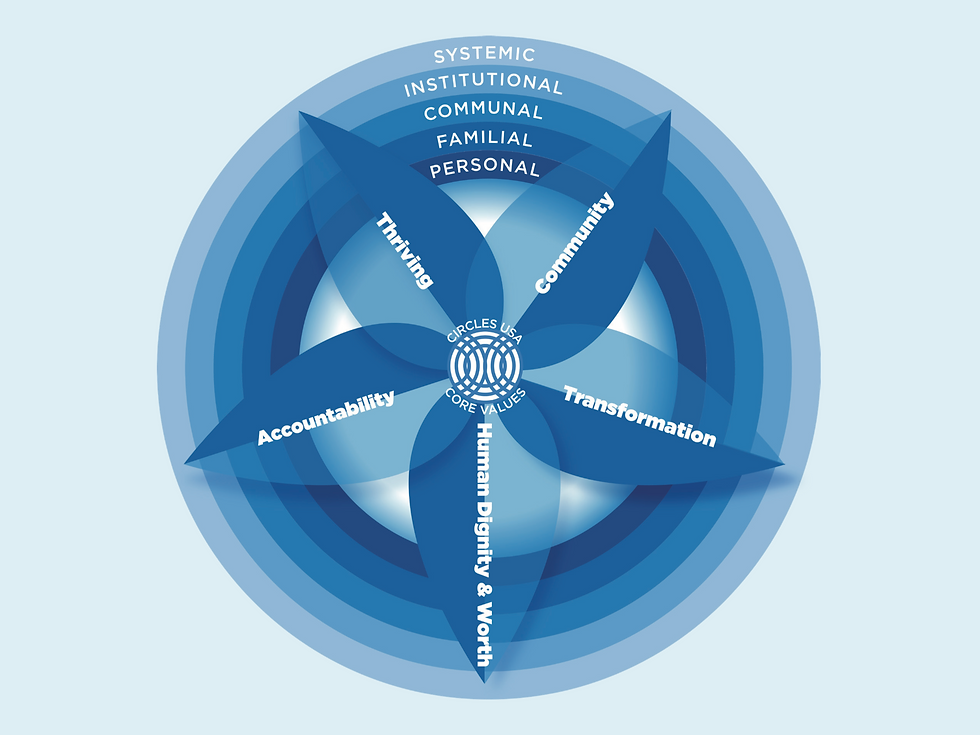Letting Go of the Drama Triangle
- Mar 6, 2020
- 3 min read
Updated: Oct 6, 2024
There can be a strong temptation for some of us to try to rescue each other from our problems. This attempt often backfires and creates resentments in our closest relationships. Circles USA warns volunteers about the Drama Triangle, also known as the Rescuer Triangle.
In his book A Game Free Life (karpmandramatriangle.com), psychotherapist Dr. Stephen Karpman explains the roles and interaction of the Drama Triangle:

Persecutor: Appears controlling, critical, angry, authoritative, rigid, superior.
Rescuer: Needs to be needed. Enables others to remain dependent and gives them permission to fail; rescuing helps rescuers avoid facing their own issues.
Victim: Appears oppressed, helpless, powerless, ashamed—finding it difficult to make decisions or solve problems.
As friends, we are vulnerable to being lured into the Drama Triangle frequently. How do we know we are in it?
We criticize, blame, and do our best to make someone else wrong—assigning fault.
We feel we don’t have viable options or the ability to negotiate to get what we want.
We rush to fix something so that someone else feels better.
As Americans, we tend to be indirect in our communications, taking a more passive-aggressive approach when we are not getting what we want. In Circles USA, however, we encourage everyone to learn how to steer clear of the drama triangle and simply ask for what they want or need, knowing that if the other person can’t give it to us, we have other options for meeting our needs and wants.
As a leader, I receive occasional invitations from people to jump on the Drama Triangle with them. It typically starts with someone’s feelings of disappointment, the subtext being “you are not doing what I want you to be doing, and there is something really wrong with you for not doing it the way I think you should be doing it. I am going to try to make you feel guilty enough to give me what I want.”
If we don’t get onto the Drama Triangle, there is no drama. There is simply a renegotiating of expectations and moving forward under a new and updated agreement. Or, the agreement might be that we don’t go forward together but rather move in different directions. Either way, the result is healthier than making decisions and acting while still emotionally stuck in the Drama Triangle.
If we make decisions because we feel attacked and shamed, then we will resent the other person in the relationship. If we decide to quit a relationship while angry or feeling victimized without communicating clearly what we want instead, we risk ending things prematurely and recreating the dynamics with someone new. We miss out on the lesson underneath what the distress is all about, a lesson that makes us stronger and more cognizant of our own unhealthy patterns.
I have organized my work and personal life so that I have fewer and fewer interactions with people who use the Drama Triangle as a way of doing business with others. If we create an environment in Circles USA that reinforces direct and respectful communication and extend that into all of our professional and personal relationships, it can become second nature to simply say “no” when the invitation to play in the Drama Triangle shows up next.
While stepping out of the Drama Triangle may necessitate leaving some friends behind, the relationships you consciously choose to keep will be of a higher quality, which creates more stability in the long run.
From the book: Enough Money, Meaning & Friends ~ By Scott C. Miller
To learn more about Scott Miller, please see his website here.





Comments